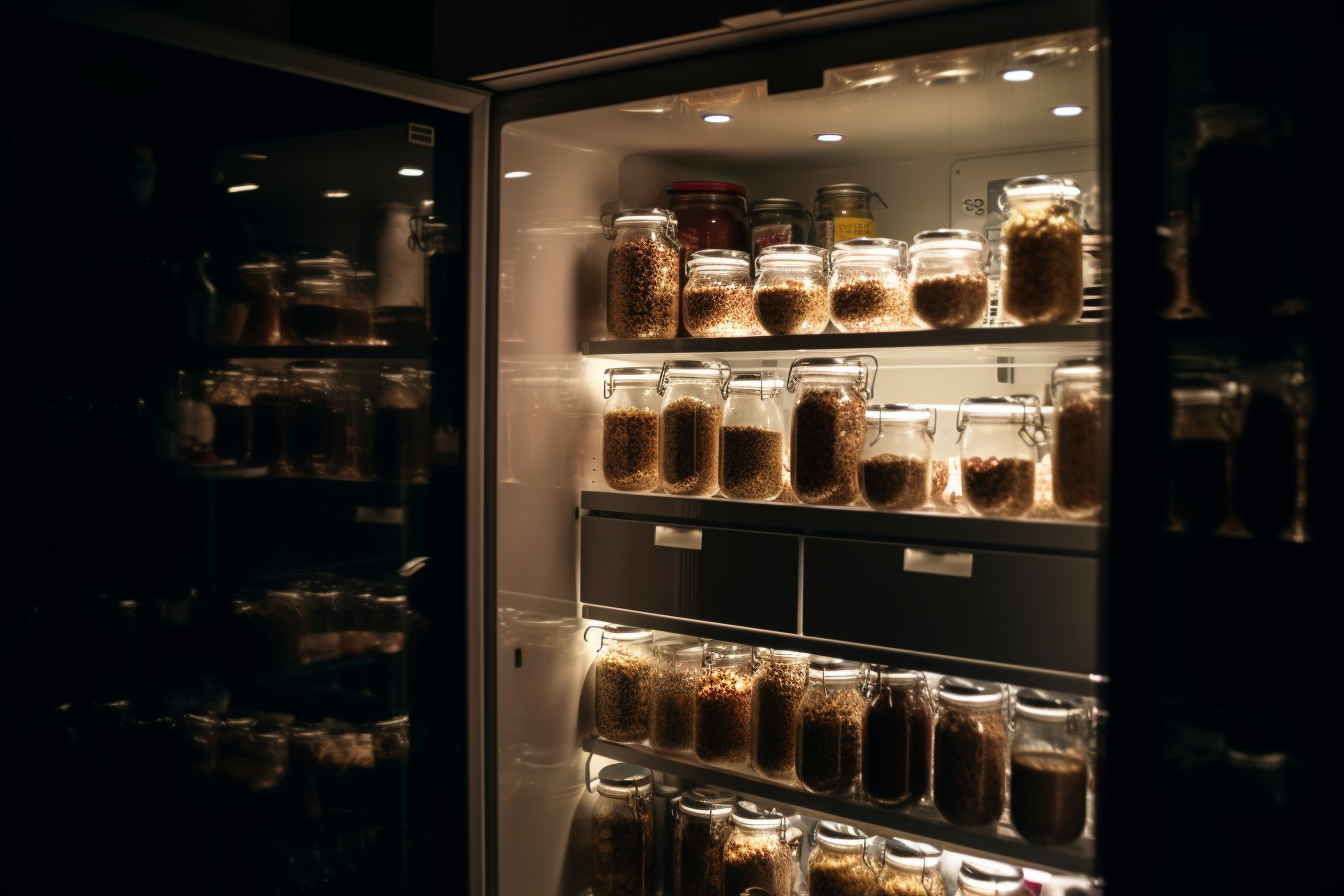Coffee in the Refrigerator: to Store or Not to Store?

Table of Contents
The question of whether coffee should be stored in the refrigerator or not is one that, despite its apparent obviousness, often leads to heated debates among both passionate coffee enthusiasts and experts. This difference in viewpoints is understandable when considering how much the enjoyment and quality of coffee depend on proper storage. From the shelf life of the beans and the preservation of the variety of aromas to potential health impacts – all these aspects are heavily influenced by how we store our coffee. Therefore, it is important to understand the different storage methods and how they affect the quality of the coffee beans over an extended period.
What Aspects Hasten the Expiration Date of Coffee Beans?
To truly understand the effects of storage on coffee beans, we first need to look at the factors that hasten the expiration date of the beans. Coffee beans, especially after being roasted, are quite sensitive and react to a variety of environmental conditions. Four main factors play a crucial role: air, humidity, temperature, and light. Each of these factors can hasten the expiration date of coffee beans and impact their quality.
For instance, exposure to air can cause coffee beans to oxidize, ultimately affecting their flavor. Similarly, moisture and temperature fluctuations can impair the quality of coffee beans by altering their aromas and even promoting the formation of mold. Finally, light, particularly direct sunlight, can bleach coffee beans and affect their flavor.
Storing Coffee: The Different Methods
There are various methods for storing coffee, each with its own advantages and disadvantages. The most common methods are storage in a cupboard, in the refrigerator, or in the freezer.
Storing coffee in a cupboard is probably the most frequent method. This approach protects the beans from light while keeping them dry and at room temperature. However, regular exposure to air can affect the flavor of the beans, especially if the container is frequently opened and closed.
Refrigerator storage is another approach that is often discussed. A refrigerator can help keep coffee beans fresh for longer since the low temperature slows down oxidation. But be cautious, refrigerators are generally humid environments, and the beans can absorb odors from their surroundings, which can alter their taste.
Freezer storage is another option, often recommended as the best long-term solution for preserving coffee. Frozen beans oxidize more slowly and retain their freshness over a longer period. However, it’s important to store them in an airtight container to avoid moisture and odors. Also, the container should only be opened once the beans have fully thawed to prevent condensation.
The Refrigerator Theory: Why Some Are For It While Others Are Against It
The refrigerator theory for coffee storage definitely polarizes opinions. Some swear by it, while others strictly oppose it. But why does this discrepancy exist?
Proponents of refrigerator storage argue that the lower temperatures slow down the aging process of the beans, thereby preserving the aromas for a longer time. They believe that storing coffee in the refrigerator keeps it fresher and enhances its flavor. Indeed, when properly stored in the refrigerator, coffee can be kept for a few weeks with minimal impact on taste.
Opponents of refrigerator storage, on the other hand, argue that the humidity and varying temperatures in the refrigerator can cause condensation to form on the beans. This can lead to mold formation and ruin the beans. Moreover, coffee beans are porous and can therefore absorb odors from their surroundings. In a refrigerator, which often houses a variety of foods and smells, this can lead to your coffee acquiring unwanted flavor notes.
It’s clear that both sides have compelling arguments, and the question of whether or not to store coffee in the refrigerator depends on specific conditions and preferences. In the next section, we will take a look at what experts and science have to say about this.
What Do the Professionals Say?
When it comes to expert opinions on storing coffee in the refrigerator, views are mixed, with many warning about potential downsides. The Specialty Coffee Association of America, one of the leading authorities in the coffee industry, for example, recommends storing coffee at room temperature in an airtight container.
From a scientific perspective, there are studies examining the effects of different storage methods on coffee beans. One study published in the journal Scientific Reports found that storing coffee at lower temperatures can help preserve its freshness and slow down oxidation. However, the researchers noted that it’s important to store the beans in an airtight container to keep out moisture and odors.
Another factor often emphasized by experts is the consistency of storage conditions. Whether you opt for storage in a cupboard, refrigerator, or freezer, it’s important to minimize temperature fluctuations and avoid exposure to air and moisture in order to preserve the quality and flavor of your coffee.
Tips for Optimal Coffee Storage
For optimal coffee storage, there are several important tips to consider, whether you choose to store it in a cupboard, refrigerator, or freezer.
- Airtight Packaging: Coffee beans are extremely sensitive to oxygen. Therefore, it’s essential to store coffee in an airtight container to minimize oxidation and maintain freshness.
- Protection from Light: Light, especially sunlight, can affect the aroma and quality of coffee. Dark containers or cabinets are ideal for protecting your coffee from light.
- Temperature Stability: Large temperature fluctuations can negatively affect the taste of coffee. It’s advisable to store coffee in a place where the temperature remains relatively constant.
- Avoiding Moisture: Since coffee beans are hygroscopic and absorb moisture from the environment, they should be stored in a dry place. If you opt for refrigerator or freezer storage, ensure the container is truly airtight.
- Fresh Beans: Purchase coffee in smaller quantities that you can use within one to two weeks. This way, you ensure you always have fresh coffee.
- Odor Neutrality: Coffee can absorb odors, so it’s best to keep it away from strong-smelling foods.
- Whole Beans: If possible, buy whole beans and grind them just before brewing. Whole beans stay fresh longer than ground coffee.
By considering these tips, you can ensure that you get the best out of your coffee beans, regardless of the chosen storage method.
Conclusion: Should Coffee Be Stored in the Refrigerator?
The debate about storing coffee in the refrigerator is multifaceted and depends greatly on individual circumstances. For large quantities that need to be stored for weeks, the freezer, combined with an airtight container, might be the solution. However, for daily use, storing coffee at room temperature, also in an airtight container, seems to best protect the beans from temperature fluctuations and moisture. Storing in the refrigerator carries more risks due to the absorption of moisture and odors, but with appropriate precautions, such as using an absolutely airtight container and minimizing taking out and reinserting, this method can work. Ultimately, it comes down to what works best for you personally.






